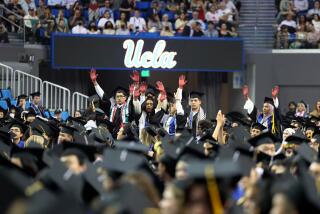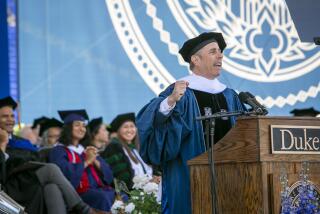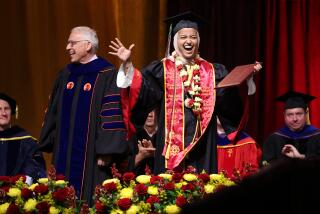Kissinger Gets Them Thinking : Commencement: He addresses the graduation ceremony for the newest crop of intellectuals of the RAND Corp. Graduate School.
- Share via
Babies cried and beepers beeped; at one point, identical twin toddlers, seeking any kind of amusement, attempted to toss coins at the august speaker’s feet.
But such fleeting distractions did not deter Henry Kissinger, who on Wednesday had come to a crowded room at the RAND Corp. to deliver a commencement address to the Santa Monica think tank’s newest crop of intellectuals.
The famous diplomat was the keynote speaker at a graduation ceremony for 17 scholars who have completed their studies at the RAND Graduate School, the 20-year-old higher-education arm of the distinguished research institute.
The speech was entitled “Conceptual Issues in U.S. Relations with the Soviet Union.”
Aside from the about-to-be Ph.D.s and assorted RAND employees, spouses, children and parents, the cozy assemblage of about 250 included two other former cabinet members, who were there to receive honorary degrees: Harold Brown, who was secretary of defense under President Jimmy Carter, and William T. Coleman Jr., transportation secretary under President Gerald Ford.
Kissinger, looking tanned and fit in a creaseless gray suit, white shirt and maroon tie, began by loosening up the crowd. He made a quip about his unmistakable, unyielding “Harvard accent.” Then he confided that he had made a “historic” vow--to limit his commencement remarks to “only 20 or 25 minutes.”
He made the by-now de rigeur comments about “the new world order” and the “end of the superpower era.” He complimented Mikhail S. Gorbachev for moving his country toward decentralization. And he described Gorbachev’s main dilemma: “weakening the opposition”--his own Communist Party--without creating an alternative institution.
But the former secretary of state’s main point was that the United States ought not base its policies concerning the Soviet Union on who wins that country’s political struggle, Gorbachev or Boris Yeltsin. What U.S. foreign policy really needs, he argued in his trademark gravelly monotone, is a “concept of the American national interest.”
Perhaps it was the time limit or maybe a desire to provide global grist for the think-tank’s intellectual-gossip mill. But as to exactly what that “concept” should be, Kissinger did not elaborate.
Nonetheless, the graduates--six women and 11 men--were suitably impressed by the Nobel Laureate’s address. At a cocktail reception in a sunny courtyard later, some of them asked for his autograph--a scrawl that bore a strong resemblance to a flat line on an EKG machine.
Thinking back to the commencement address, one of the new doctors of philosophy, whose dissertation on combat logistics had a title nearly as long as a phone directory, said he felt “a little out of place” even trying to critique the great Kissinger.
“I don’t know what to say,” said Brian Leverich, “except that everything he said in there was right.”
More to Read
Sign up for Essential California
The most important California stories and recommendations in your inbox every morning.
You may occasionally receive promotional content from the Los Angeles Times.














